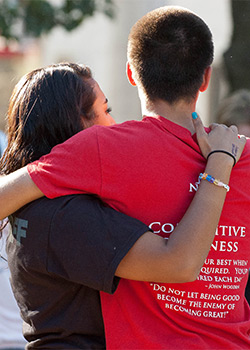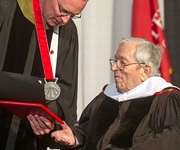Degrees of Grief
by Harlan Van Oort ’82
 Dealing with life’s inevitable sorrows is difficult—no more so than when a young person is also trying to be a college student. This past school year, nine Northwestern students experienced the death of a parent. One, Brittany Vollmer, lost her entire family—mother, father and younger brother and sister—in a car accident. Dozens of students said a final goodbye to grandparents or other beloved family members, and scores are still grieving losses from previous years. It has been a season of suffering.
Dealing with life’s inevitable sorrows is difficult—no more so than when a young person is also trying to be a college student. This past school year, nine Northwestern students experienced the death of a parent. One, Brittany Vollmer, lost her entire family—mother, father and younger brother and sister—in a car accident. Dozens of students said a final goodbye to grandparents or other beloved family members, and scores are still grieving losses from previous years. It has been a season of suffering.
The demands of college classes and co-curricular responsibilities require intense focus. Tragedy is a thunderous interruption, followed by days, weeks and months of emotional storms and distracted fogginess. College life goes on, but students in grief find it almost impossible to function at their previous level of intellectual effort. They feel distracted, consumed with thoughts of their loved one, and mired in the pain. Students in grief don’t bring their “A” game.
Moving through the stages of grief takes time—requires time—time spent in communication with family and friends, time spent remembering, time spent recovering, time unavailable to devote to one’s calling as a student.
It is always important to be in tune with one’s feelings, but especially in grief. Like anyone who has suffered a loss—whether expected or sudden—students feel anxious and sad as they try to imagine a new, uncertain reality. They describe feeling like internal curtains have been drawn and loneliness has taken up residence. They erupt in anger unexpectedly and with no explanation or target for their rage. Sometimes the only thing to do is to become angry with God and cry, as David did, “How long, O Lord? Will you forget me forever?” (Psalm 13:1).
People in grief commonly ask, “Why, God?” It’s a major theological question—and one that must be left unanswered. Well-meaning friends, like Job’s, sometimes attempt to answer the question, even though they have no clue what to say. They try to justify God with attempts to explain God, which is dangerous. It’s an uneasy comfort to trust the paradox that God is sovereign but this loss is not God’s will.
Sometimes well-meaning friends will also attempt to force God’s hand, implying that God will make the event of loss magically disappear. Theologian Frederick Buechner corrects that thinking: “When horrors happen, we can’t use God to make them un-happen.” The valley of the shadow of death is not so easy to escape—yet our Good Shepherd has promised to stay beside us as we walk through it.
The Northwestern community has been reminded it’s best to travel through the valley of the shadow of death together. One student wrote, “The support and community at this school is abundant, and I cannot tell you how much I feel blessed to be a part of this campus. [Few] other colleges would truly care about the loss of my dad, [but] Northwestern did.”
Northwestern knows how to support students in grief. We know the Holy Spirit is present with us, and Christ not only knows suffering, he suffers with us. Our campus family includes trained counselors to help students sort out their conflicting feelings and move to a better awareness. The community of the Holy Spirit on campus is strong.
Doing college while grieving is unavoidable for some students. But we journey together, walking by faith rather than sight. We trust in the power and presence of the Holy Spirit to provide hope of the resurrection to eternal life through Christ our Lord, and the love of God shown by God’s people.
The Rev. Harlan VanOort has been Northwestern’s chaplain since 2003, serving as students’ pastor while they are away from their home churches and families.
 Whether it’s tulips planted on campus or bricks used to build the new learning commons, we have the facts and figures to satisfy your curiosity.
Whether it’s tulips planted on campus or bricks used to build the new learning commons, we have the facts and figures to satisfy your curiosity. Social work professor sheds light on domestic abuse that doesn’t bruise but still does damage
Social work professor sheds light on domestic abuse that doesn’t bruise but still does damage Life-changing accident doesn’t stop professor who loves learning
Life-changing accident doesn’t stop professor who loves learning
Classic Comments
All comments are moderated and need approval from the moderator before they are posted. Comments that include profanity, or personal attacks, or antisocial behavior such as "spamming" or other inappropriate comments or material will be removed from the site. We will take steps to block users who violate any of our terms of use. You are fully responsible for the content that you post. Comments posted do not reflect the views or values of Northwestern College.